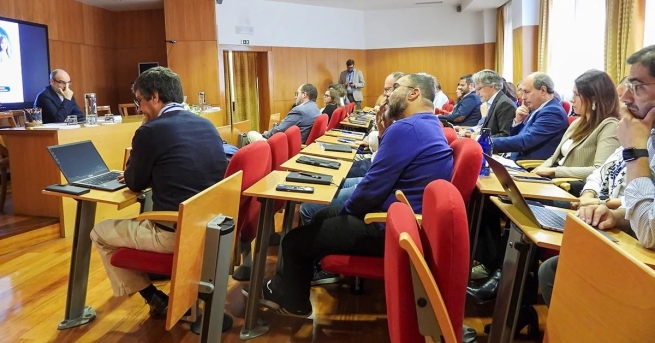In the opening session, in front of 44 principals, teachers and psychologists from the Salesian houses in Estoril, Évora, Funchal, Lisbon, Manique, Porto and Setúbal, the Salesian Provincial, Fr Tarcízio Morais, provided a historical overview of the Salesian vocation to professional training, "a sector that in the past represented about 60% or 70% of the educational offer of the Salesians". He explained the purpose of the meeting: "In Portugal we are doing work in this sector that we do not know. That's why we are organising this Forum. ”
At the beginning of the meeting, the results of a survey conducted among students from the eighth to the twelfth class of the Salesian Vocational Training Centres (VET) were presented, with about 3,000 students interviewed, distributed among the various grades and the various schools in Portugal.
Subsequently, the former Minister of Education, João Costa, said that it is necessary to eliminate the connotative language associated with the distinction between types of education, and give greater visibility to vocational courses and create new courses. As for the national scene he said: "We are hostage to a maxim from the era of the Estado Novo: ‘if you are not good enough to study, go to work’". And he regretted that the system of access to higher education continues to be more oriented towards science courses. Focusing on pedagogical autonomy and curricular flexibility, he said that vocational education has numerous advantages over other educational models.
Joaquim Azevedo, professor at the Portuguese Catholic University and member of the National Council of Education, presented the evolution of VET in Portugal and Europe and the prospects for the future. And he also blamed the "persistent prejudice against VET, which has to do with social and socio-economic factors".
Currently in Portugal the network of vocational schools has about 180 schools and absorbs almost half of the students. Some of the features of this type of education, he said, allow for more flexible regimes: modular pathways, personalised teaching, and a closer pedagogical relationship. However, there must be a safe, clear and structured basis.
João Santos, former Deputy Director of the Directorate General for Employment, Social Affairs and Inclusion of the European Commission, presented the European reality. Indicating how the objective of European education policies is to promote high quality education that is accessible, inclusive and adaptable to the new needs of the labour market. And he argued that it is important that countries take advantage of the permanent impact that European Funds can have. “75% of Swiss students undergo vocational training,” he said by way of example.
The education and training policy expert and consultant said he was familiar with the work of Don Bosco International, with whom he has collaborated on several occasions in Brussels. “I think there is a perfect match between Salesian values and UNESCO's Pillars of Education,” he said. He believes that the values of Salesian spirituality and the preventive system are "crucial" in formation. "These principles, the legacy of Don Bosco, must never be changed," he stressed.
At the end of his address, he said: “We are not training people to be just another cog in a machine. We are training people to be complete individuals. "
On the second day, João Miguel Gonçalves, General Director of Educational Institutions, was invited to distinguish and define the models of Vocational or Vocational Training. He praised the curricular model of national vocational education, "a unique model, built from scratch in Portugal", also highlighting the most problematic aspects, such as the financing of public schools and the lack of permeability between general and vocational education.
“In Portugal, the 50% target has been pursued for years,” he said. But for it to be achieved, he observed that the model, the choice of courses, the local reality and the surrounding network must be applied well.
After the presentation of three best practices – from the centres in Lisbon and Estoril, as well as on the case of Don Bosco Tech Europe – discussion and debate followed.
Finally, a proposal was presented for the study of the Salesians. "An ambitious 18-month plan based on innovation, relevance, autonomy and flexibility" which aims to create a diversified offer and in dialogue with the University of Porto, various business partners and the support of the Municipality of Porto, was introduced by Marco Silva, Pedagogical Director of the Salesians in Porto.
Concluding the work, Fr Morais launched a challenge to the principals and teachers present: "These two days have brought motivation. Now it is a question of thinking, discussing, planning and implementing (...) because we cannot be indifferent to the needs of young people. This is what we must do: offer a future".
Source: Salesianos.pt - https://www.salesianos.pt/noticias/fundacao-salesianos-ouve-especialistas-em-forum-sobre-o-ensino-profissionalizante/


